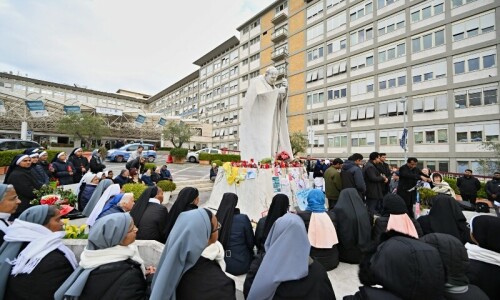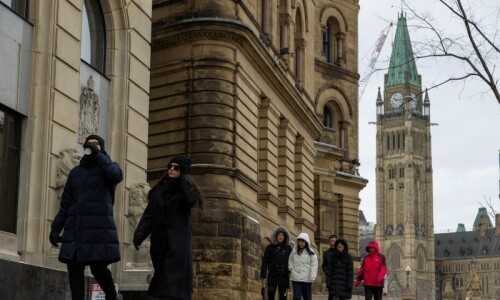Largely seen as a right-wing party, the Jamaat-i-Islami is the oldest religio-political party in Pakistan. It has a huge following among the country’s religious segments and is one of the few parties that hold intra-party elections every three years.
JI, like all other major parties of the country, had been negotiating seat-adjustments and electoral alliances, both on the federal and provincial levels, with other parties. Pakistan Tehrik-i-Insaaf (PTI), Pakistan Muslim League-Nawaz (PML-N) and Pakistan Muslim League – Functional (PML-F) are viewed as potential, even natural, allies of JI in the 2013 polls.
Brief history
After partition, JI was reorganised and moved to Pakistan as Jamaat-i-Islami Pakistan. The party’s cadre that remained in India went on to form the Jamaat-i-Islami Hind, a separate organisation that shares JI’s ideological aspirations.
JI's intellectual inspiration primarily came from Syed Abul Ala Maududi, an ideologue and a staunch proponent of political Islam, who also founded the party.
The JI has never been sworn in to lead a federal government, but has ruled Khyber Pakhtunkhwa and Balochistan as part of the now-defunct MuttahidaMajlis-i-Amal (MMA) after the 2002 polls.
Political stance JI proclaims that its aim is to propagate Islam and its teachings amongst all followers of the religion. The party maintains cordial ties with all Muslim states and religio-political lobbies.
Establishment of a state run under Sharia laws is one of the most important features of the party’s mandate. It stands opposed to what it calls western values and is particularly critical of secularism and the economic systems of capitalism and socialism.
The party also has a firm stand on the Kashmir issue, which it reiterates from time to time. In relation to this position, JI’s Central Majlis-i-Shoora (Advisory Council) passed a resolution in December 2009, demanding that the Pakistani government halt all dialogue with India over ‘state-sponsored’ violence taking place in the region. The resolution also alleged that India, along with the United States and Israel, was involved in “fostering destructive activities” on Pakistani soil.
In order to resolve the issues being faced by Muslims the world over, the party decided to join hands with Egypt's Muslim Brotherhood in 2011. Moreover, JI has also expressed support for leaders of the Bangladeshi Jamaat-i-Islami, whose leaders are currently being tried for alleged involvement in war crimes during the 1971 independence conflict.
One of the salient features of JI’s election manifesto is guaranteed generation of 20,000 megawatts of electricity within six months of coming to power. The party has also announced its opposition to ‘all kinds of terrorism’ in its manifesto, saying it would launch a crackdown against those involved and bring the perpetrators to justice.
The party has also vowed to make efforts to trace the “missing” and hold to account those responsible, be they individuals or groups.
It has also pledged to bring US drone attacks on Pakistani soil to an immediate halt and to cease all ongoing military operations in the country.
Over the years Jamaat has an active political history from running a campaign against the Ahmedi community in 1953 to playing an active role in the fight against the Soviet Union in Afghanistan during General Ziaul Haq’s regime. This is also consistent with the assessment that the views of JI tie in with the so-called national security interests of the military establishment — or at least such seems to have been the case in past instances.
After Zia's death, JI joined a right-wing alliance – Islami Jamhoori Ittehad (IJI) — which operated under the leadership of Nawaz Sharif and was formed to stand in opposition to the Pakistan Peoples Party in the 1998 general election.
By the time the 1993 election happened, IJI had disappeared from the scene and JI preferred to contest under the name of Pakistan Islamic Front (PIF). However, the PIF only managed to capture a handful of seats in the National Assembly at the time.
Once bitten, twice shy, JI ended up boycotting the 1997 election. But came 2002, and JI became part of a formidable force constituting of a number of religio-political parties: the MuttahidaMajlis-i-Amal (MMA). The MMA secured 59 out of the 342 seats in the National Assembly. This alliance took a majority in the Khyber Pakhtunkhwa province (then known as North West Frontier Province) and formed a coalition government with the Pakistan Muslim League – Quaid (PML-Q) in Balochistan.
The JI once again boycotted election in 2008 as a member of the All Parties’ Democratic Movement, saying the polls would not be free and transparent.
Recently, JI also declined to become one of the guarantors in negotiations between the government and the Tehrik-i-Taliban Pakistan (TTP). Its Deputy Secretary General Farid Ahmed Piracha said the party could not take on the role while the government had failed to implement resolutions passed by Parliament on the matter.
However, more recently, JI did take part in an All Parties Conference called by the JamiatUlema-i-Islam-Fazl (JUI-F) which supported the idea of a grand tribal jirga to act as a platform for peace talks with the Pakistani Taliban.
Key figures
Syed Munawwar Hasan, Liaquat Baloch, Sirajul Haq, Fareed Ahmed Piracha, Abdul Ghaffar Aziz, Khurshid Ahmad
— Research and text by Soonha Abro













































